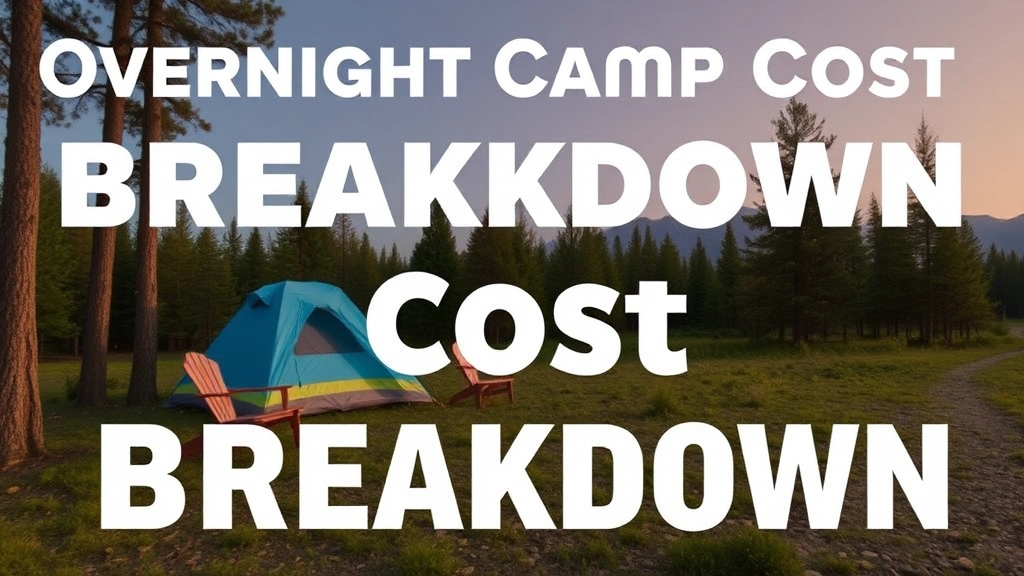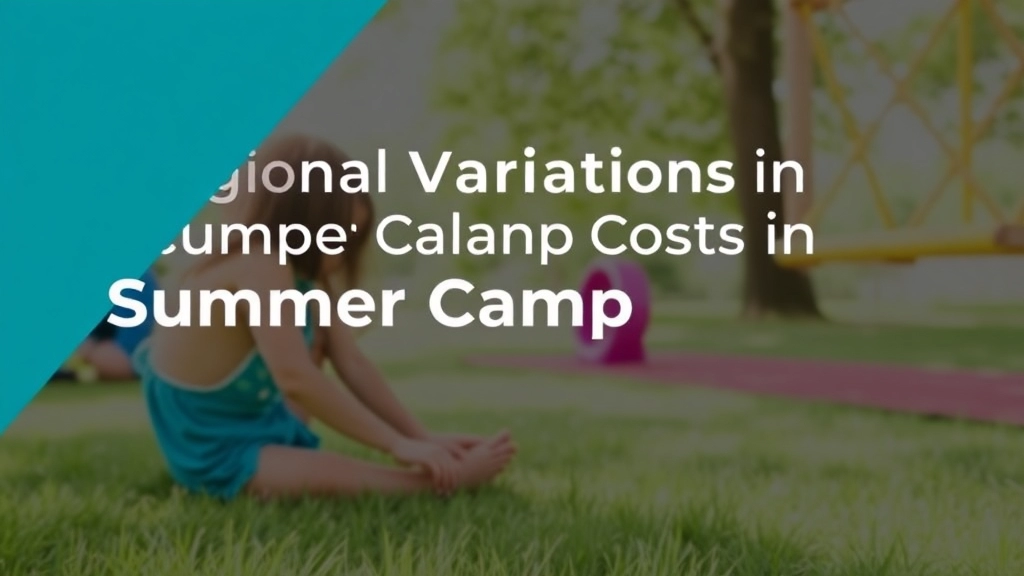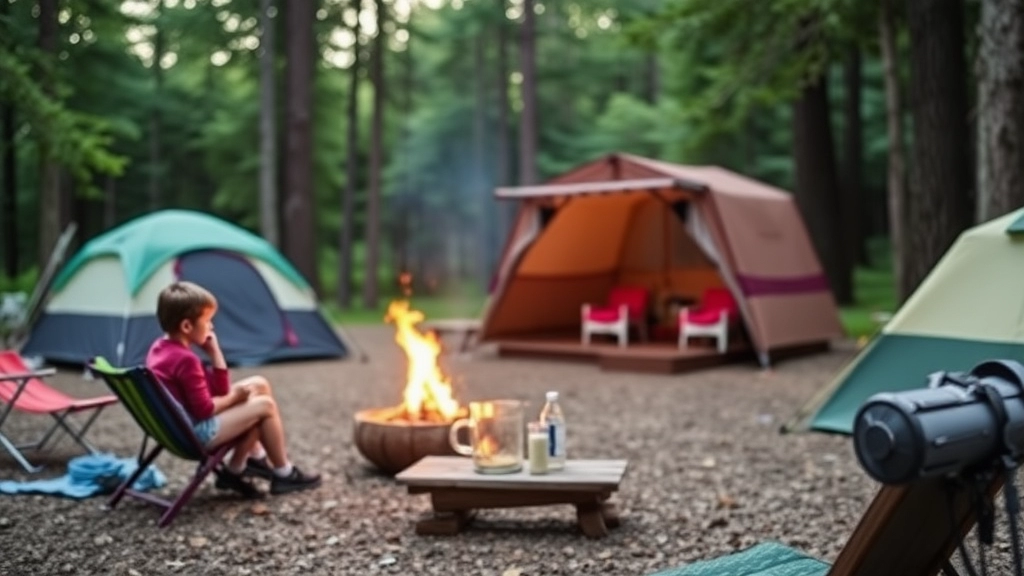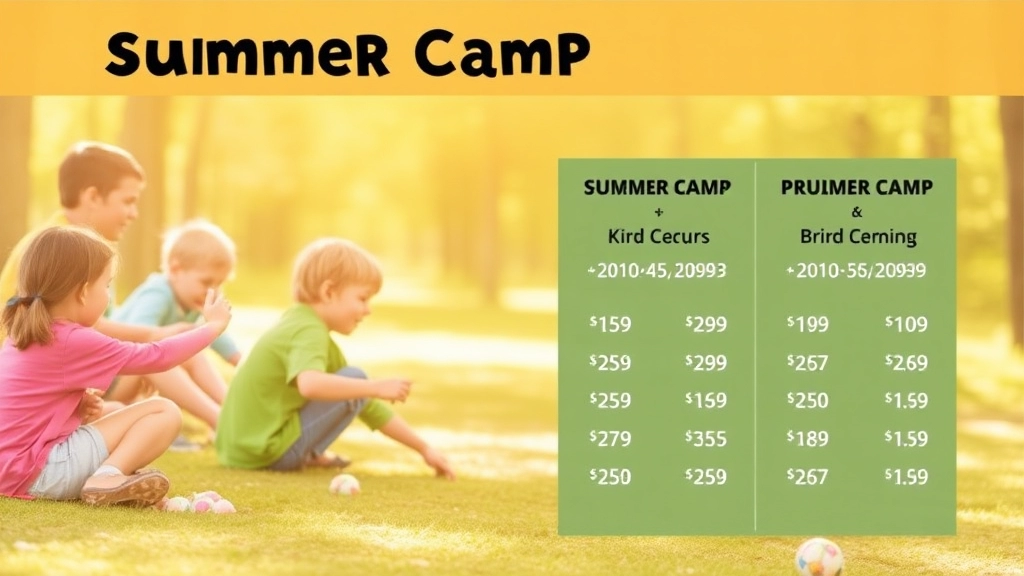Understanding Summer Camp Pricing
When it comes to summer camp pricing, understanding the costs involved can help you make an informed decision for your child. Whether you’re looking at day camps, overnight camps, or specialty camps, knowing what to expect financially is crucial. Day camps typically offer a more budget-friendly option, while overnight camps provide a more immersive experience but often come at a higher price.
Specialty camps, which focus on specific activities like sports or arts, can vary widely in cost depending on the resources required. Regional variations also play a role, with camps in urban areas generally being more expensive than those in rural settings. Don’t forget to factor in additional fees for meals, transportation, and equipment.
Financial aid, scholarships, and early registration discounts can help make summer camp more affordable. By comparing the costs and benefits of different camp types, you can find the perfect fit for your budget and your child’s interests.
Day Camp Pricing Overview
Ever wondered, “How much is a day camp going to set me back?” You’re not alone. Let’s break down the nitty-gritty of day camp pricing so you know exactly what you’re getting into.
Why Are Day Camps So Popular?
Day camps are a hit for parents and kids alike. They offer a great balance of fun, learning, and social interaction without the commitment of an overnight stay. But how much do you need to budget for this experience?
What’s the Average Cost?
Here’s the deal: day camp prices can vary widely. On average, you’re looking at anywhere from £100 to £500 per week. Yeah, that’s a big range, so let’s dig deeper.
Factors Influencing Day Camp Costs
- Location: Camps in big cities or affluent areas will cost more. It’s just the way it is.
- Duration: Some camps run for half a day, others for a full day. Full-day camps generally cost more.
- Activities: Specialised activities like horse riding or tech workshops can bump up the price.
- Staff-to-Camper Ratio: More staff means better supervision but also higher costs.
Real Talk: What Are You Really Paying For?
So, what does your money get you? Typically, day camp fees cover:
- Basic Activities: Crafts, sports, and games.
- Supervision: Trained staff to keep your kids safe and engaged.
- Facilities: Access to playgrounds, swimming pools, or sports courts.
Hidden Costs to Watch Out For
Don’t get blindsided by extra fees. Sometimes, camps charge additional fees for:
- Field Trips: These can add up quickly.
- Special Equipment: Some activities might require gear that’s not included.
- Meals: Not all camps provide lunch, so you might have to pack one or pay extra.
Real-World Example
Take Sarah, a mum of two from Manchester. She found a local day camp costing £150 per week per child. It included all the basics but had extra fees for swimming lessons and a weekly trip to the zoo. In the end, she paid about £200 per week per child. Not bad, but those extras can sneak up on you.
Is It Worth It?
Absolutely. Day camps are a fantastic way for kids to make friends, learn new skills, and have a blast during the summer. Plus, it gives you a break too. If you’re looking for more detailed insights, check out our Summer Camp Guide to find the perfect fit for your child. For additional tips on how to save on camp costs, our article on FSA Tips for Summer Camp Savings might be useful.
Overnight Camp Cost Breakdown

Ever wondered why overnight camps cost an arm and a leg?
Let’s break it down, mate.
What’s in the Price Tag?
First off, you’re paying for more than just a place to crash.
Here’s the deal:
- Accommodation: Think cabins, lodges, or tents. Not your average bedroom.
- Meals: Three squares a day, sometimes more. We’re talking breakfast, lunch, dinner, and snacks.
- Activities: From archery to zip-lining. It’s all in the package.
- Staff: Trained professionals, not just any random bloke. Safety and fun guaranteed.
Real Talk: How Much Are We Talking?
On average, overnight camps can set you back anywhere from £500 to £2,000 per week.
Yeah, you read that right.
Here’s a quick breakdown:
| Camp Type | Cost Per Week |
|---|---|
| Basic Camp | £500 – £800 |
| Mid-Range Camp | £800 – £1,200 |
| High-End Camp | £1,200 – £2,000+ |
Hidden Costs You Might Miss
Don’t forget these sneaky extras:
- Uniforms: Some camps have specific gear.
- Special Activities: Horse riding or scuba diving could cost extra.
- Transport: Getting there and back isn’t always covered.
Why the High Price?
Think about it.
You’re not just paying for a bed and some food.
You’re investing in an experience.
- Safety: Camps have to meet strict safety standards.
- Expertise: Qualified staff to keep your kids safe and engaged.
- Facilities: Pools, climbing walls, and other cool stuff.
Real Example:
Take Camp XYZ, for example.
They charge £1,500 a week.
Sounds steep?
But they offer:
- Expert-led activities
- Gourmet meals
- Top-notch facilities
Bottom Line
Overnight camps aren’t cheap.
But the value?
Priceless.
Specialty Camps: Factors Influencing Price
Alright, so you’re probably wondering, “What makes specialty camps so darn expensive?” Trust me, you’re not alone. As a parent, I’ve been there, scratching my head and questioning if it’s worth the extra cash. Let’s dive into the nitty-gritty of what drives the cost of these camps.
What are Specialty Camps?
First off, let’s get on the same page. Specialty camps are those focused on a specific skill or interestâthink coding, horseback riding, theatre, or even space camp. They offer a more targeted experience compared to general day or overnight camps.
Factors Influencing Price
- Expert Instructors
- Specialised Skills: These camps often hire professionals with specific expertise. For instance, a coding camp might bring in software engineers or a theatre camp could hire professional actors.
- Higher Salaries: Naturally, these experts command higher salaries, which trickles down to the camp fees.
- Specialised Equipment
- High-Cost Gear: Whether it’s high-end computers for a coding camp or top-notch musical instruments for a music camp, the equipment isn’t cheap.
- Maintenance: Keeping this gear in tip-top shape also adds to the expenses.
- Limited Enrolment
- Smaller Groups: Specialty camps often have smaller group sizes to offer personalised attention.
- Higher Costs Per Camper: With fewer campers to spread the costs around, the price per child goes up.
- Intensive Curriculum
- Custom Programs: These camps usually have a well-thought-out curriculum designed by experts. This isn’t your run-of-the-mill campfire sing-along; it’s structured, intensive learning.
- Materials and Resources: The cost of specialised materials and resources can add up quickly.
- Location and Facilities
- Exclusive Venues: Some specialty camps are held in unique locations that offer the best environment for that particular activityâlike a marine biology camp by the ocean.
- High Maintenance: These exclusive venues often require more maintenance and, therefore, more money.
Real-World Example: Coding Camp
Take a coding camp, for example. These camps are often pricey because they hire software engineers to teach the kids. They also need high-end computers and software licenses. Plus, they usually keep the groups small to ensure each child gets enough attention. All these factors make the cost shoot up.
Breaking It Down
So, let’s recap the main factors driving up the cost of specialty camps:
- Expert Instructors: Higher salaries for professionals
- Specialised Equipment: High-cost gear and maintenance
- Limited Enrolment: Smaller groups mean higher costs per camper
- Intensive Curriculum: Custom programs and materials
- Location and Facilities: Exclusive venues with higher maintenance costs
At the end of the day, the price of specialty camps is driven by the quality and specificity of what they offer. From expert instructors to specialised equipment, you’re paying for a unique, targeted experience that general camps just can’t match.
If you’re looking for top-notch specialty camps, check out our Top Acting Camps for the Summer 2024 or explore the Rock Climbing Summer Camp Guide for some great options.
Regional Variations in Summer Camp Costs

Ever wondered why summer camp prices are all over the place?
Let’s dive in.
Why Do Camp Costs Vary by Region?
First off, location, location, location.
Camps in urban areas? They can cost a pretty penny.
Rural spots? Often cheaper.
Factors at Play
- Cost of Living: Higher in cities, lower in the countryside.
- Local Demand: More kids = higher prices.
- Facility Quality: Top-notch amenities? Expect to pay more.
Real Talk: What Does This Mean for You?
City Camps:
- More expensive.
- Better facilities.
- More specialised programmes.
Countryside Camps:
- Cheaper.
- More nature-focused activities.
- Often less crowded.
Breaking It Down
Here’s a quick comparison:
| Region | Average Cost (per week) | Key Features |
|---|---|---|
| Urban Areas | £500 – £1,000 | High-end facilities, specialised activities |
| Suburban Areas | £300 – £700 | Balanced options, good facilities |
| Rural Areas | £200 – £500 | Nature-focused, fewer frills |
Personal Example
I remember sending my niece to a camp in the Lake District.
Cost? £300 for the week.
Experience? Priceless.
She came back with stories about hiking, canoeing, and making lifelong friends.
What Should You Consider?
- Budget: Know what you can afford.
- Interests: What does your kid love?
- Location: How far are you willing to travel?
Pro Tips
- Do Your Homework: Compare camps in different regions.
- Ask Around: Other parents can be gold mines of info.
- Visit Camps: If possible, check them out in person.
Final Thoughts
Regional variations in summer camp costs are real.
But understanding them can help you make a smart choice.
So, where will your kid be spending their summer?
Additional Fees: Meals, Transportation, and Equipment
Alright, let’s get real for a second. You’re already shelling out a decent chunk for summer camp, but guess what? There are often additional fees that can sneak up on you. I’m talking about meals, transportation, and equipment. These can add up faster than you think, so let’s break it down and see where you might get hit.
Meals
First off, food. It’s a basic need, but at camp, it can come with a hefty price tag. Many camps offer meal plans, and while they’re super convenient, they’re not always cheap. Here’s what you need to consider:
- Daily Meal Plans: Some camps charge per meal, while others have a flat rate for the entire camp duration.
- Special Dietary Requirements: If your child has allergies or specific dietary needs, expect to pay more. Special meals often come at a premium.
- Packed Lunches: Some day camps require you to pack a lunch. This can save money but requires planning and effort on your part.
Transportation
Now, let’s talk about getting to and from camp. Whether it’s a day camp or an overnight camp, transportation can be a biggie.
- Camp Shuttles: Some camps offer shuttle services, but these aren’t always free. Check if the cost is included or if it’s an extra fee.
- Public Transport: Depending on the location, you might have to factor in the cost of public transportation. This can add up over the weeks.
- Driving: If you’re driving your kid to camp, don’t forget to consider the cost of fuel and possibly parking fees.
Equipment
Last but definitely not least, equipment. This can sometimes be the most surprising expense, especially for specialty camps.
- Required Gear: Many camps have a list of required gear. This could be anything from sports equipment to musical instruments.
- Rentals: If you don’t want to buy, some camps offer rental options. While convenient, rental fees can be steep.
- Specialised Equipment: For camps focused on activities like rock climbing or scuba diving, you might need specialised, and often expensive, equipment.
Real Talk: Stories and Examples
Let me give you a real-life example. A friend of mine sent her kid to a soccer camp. The camp fee was reasonable, but then came the additional costs: a new pair of football boots, shin guards, and a meal plan because her kid has a gluten allergy. By the end of it, she had spent almost double the initial camp fee.
Tips to Manage Additional Fees
Here are some quick tips to manage these sneaky additional fees:
- Ask for a Detailed Breakdown: Before you commit, ask the camp for a detailed list of all potential extra costs.
- Shop Smart: Look for second-hand equipment or borrow from friends.
- Meal Prep: If the camp allows, pack meals to save on food costs.
- Carpool: Team up with other parents to share transportation costs.
For more information on how to save on summer camps, check out our guide on using a Dependent Care FSA. If you’re looking for nutritious meal ideas, don’t miss our article on quick and nutritious summer camp meals.
Financial Aid and Scholarship Opportunities

Alright, let’s get real.
When it comes to summer camps, the cost can be a big worry for many parents.
I get it.
You want your kids to have an amazing experience, but the price tag can be daunting.
So, let’s dive into financial aid and scholarship opportunities to make it more affordable.
Why Financial Aid and Scholarships Matter
First off, not everyone has a money tree in their backyard.
And that’s okay.
Summer camps know this and often offer financial aid and scholarships to help families out.
This isn’t charity; it’s about making sure every kid gets a chance to enjoy summer camp, regardless of their financial situation.
Types of Financial Aid Available
There are different types of financial aid you can look into:
- Need-Based Scholarships: These are awarded based on your financial situation. You’ll likely need to provide some documentation, but it’s worth it.
- Merit-Based Scholarships: Got a kid who’s a superstar in something? Whether it’s sports, arts, or academics, merit-based scholarships reward talent and hard work.
- Community Grants: Sometimes local organisations or businesses offer grants to help families send their kids to camp.
- Camp-Specific Discounts: Some camps offer discounts for early registration, siblings, or even for referring a friend.
How to Apply
Applying for financial aid and scholarships isn’t as hard as you might think.
Here’s a quick rundown:
- Do Your Research: Start by checking the camp’s website. Most will have a section dedicated to financial aid and scholarships.
- Gather Your Documents: Be prepared to provide proof of income, tax returns, and other financial documents.
- Fill Out the Application: Take your time with this. Make sure you answer all the questions and provide all the necessary info.
- Submit on Time: Deadlines matter. Make sure you submit your application well before the deadline to avoid any hiccups.
Real Stories
Let me share a quick story.
I know a family who was really struggling to make ends meet but wanted their daughter to attend a specialised music camp.
They applied for a need-based scholarship and, guess what?
She got it.
That summer, she had the time of her life, and it didn’t break the bank.
Early Registration Discounts and Other Ways to Save
Ever feel like the cost of summer camps is like a punch to the gut? Yeah, me too. But here’s the good news: early registration discounts and other savvy tricks can make that blow a lot softer. Let’s dive into some real, actionable ways to save without sacrificing the fun and learning your kids crave.
Why Early Registration Discounts Matter
First off, let’s talk about why early registration discounts are your best friend. Camps love to fill spots early. It helps them plan better and gives them a sense of security. And for you? It means serious savings. We’re talking anywhere from 10% to 20% off, just for being proactive.
Example: I once signed up my nephew for a science camp in March, even though it didn’t start until July. The camp fee was £800, but with the early bird discount, I paid just £640. That’s £160 that stayed in my pocket.
Other Smart Ways to Save
But early registration isn’t the only trick up your sleeve. Here are some other ways to keep costs down:
- Group Discounts:
- Many camps offer discounts if you sign up with friends or siblings.
- Example: A local sports camp offered a 15% discount per child if you enrolled two or more siblings. That’s a win-win.
- Off-Peak Weeks:
- Camps often have cheaper rates during less popular weeks.
- Example: Enrolling your child in the first week of camp instead of peak mid-July can save you a bundle.
- Payment Plans:
- Spread out the cost over several months instead of one big payment.
- Example: Some camps let you pay in instalments, making it easier on the wallet.
- Referral Programs:
- Refer a friend, and both of you get a discount.
- Example: A music camp offered £50 off for every new camper you referred. I got two friends to sign up, and bam, £100 saved.
Don’t Forget About Scholarships and Financial Aid
Many camps offer scholarships or financial aid. Don’t be shy about asking. It’s there for a reason.
Example: My friend applied for a scholarship for her daughter’s art camp. She wrote a heartfelt letter explaining why her daughter deserved it, and they got a 50% discount.
Early Bird vs. Last-Minute Deals
Sometimes, waiting until the last minute can also score you a deal. Camps would rather fill a spot at a discount than leave it empty.
Example: I snagged a last-minute spot for my cousin at a tech camp for 30% off because someone else cancelled.
Choosing the Right Camp Based on Budget and Interests

Struggling to find the perfect summer camp for your kid without breaking the bank?
You’re not alone.
We all want the best for our kids, but we also need to keep an eye on our wallets.
Here’s how you can choose the right camp based on budget and interests, without compromising on fun or quality.
Start with Your Budget
First things first, set a budget.
Knowing how much you’re willing to spend can narrow down your options quickly.
- Day Camps: Generally cheaper, great if you want to save on overnight costs.
- Overnight Camps: More expensive but offer a full immersive experience.
- Specialty Camps: Costs can vary widely depending on the focus, like sports or arts.
Match Interests with Camp Types
Now, think about what your kid loves to do.
This step is crucial because the right camp should excite them.
- Sports Enthusiasts: Look for camps that focus on their favourite sport.
- Artistic Souls: Find camps with strong arts, music, or drama programmes.
- Adventurers: Outdoor camps with hiking, canoeing, or survival skills can be a hit.
Check Reviews and Ratings
Don’t just take the camp’s word for it.
Check reviews and ratings from other parents.
This can give you a real sense of what to expect.
- Online Reviews: Websites like Trustpilot or Google Reviews can be gold mines.
- Word of Mouth: Ask other parents in your community or school.
Consider Additional Costs
Sometimes the advertised price isn’t the whole story.
Watch out for hidden fees, like meals, transportation, or special equipment.
- Meals: Some camps include meals, others don’t. Check beforehand.
- Transport: Will you need to arrange this, or is it included?
- Equipment: Does the camp require special gear?
Financial Aid and Scholarships
Don’t let cost be a deal-breaker.
Many camps offer financial aid or scholarships.
- Early Bird Discounts: Sign up early to snag a discount.
- Payment Plans: Some camps offer instalment plans to spread out the cost.
Real-Life Example
Last summer, my friend’s son, Tim, wanted to go to a robotics camp.
The price was steep, but they found a scholarship that covered half the cost.
Tim had a blast, and they didn’t have to empty their savings.
Comparing Cost vs. Benefits of Different Camp Types
What’s the Real Deal?
So, you’re looking at summer camps and wondering, “Is this worth the money?”
I get it.
It’s a big decision.
Let’s break it down.
Day Camps: Bang for Your Buck?
Day camps usually cost less than overnight camps.
But what do you really get?
Pros:
- Cheaper: Less strain on the wallet.
- Convenient: No need for overnight gear.
- Flexible: Drop-off and pick-up times fit your schedule.
Cons:
- Limited Activities: Some day camps offer fewer options.
- Shorter Duration: Less time for kids to immerse themselves.
Overnight Camps: Worth the Extra Cash?
Overnight camps can be pricey.
But they offer a lot.
Pros:
- Immersive Experience: Kids live and breathe camp life.
- More Activities: From archery to zip-lining.
- Life Skills: Independence, responsibility, and social skills.
Cons:
- Expensive: Can be a big hit to your budget.
- Homesickness: Not all kids are ready for it.
Specialty Camps: Special Price for Special Skills?
Thinking of a camp focused on a specific skill or interest?
Pros:
- Focused Learning: Whether it’s coding, sports, or arts.
- Expert Instructors: Often led by pros in the field.
- Networking: Kids meet peers with similar interests.
Cons:
- Higher Cost: Specialised camps often cost more.
- Niche Activities: Might not offer a broad range of experiences.
How to Decide?
Ask Yourself:
- What’s your budget?
- What does your child enjoy?
- Is your child ready for an overnight camp?
Compare and Contrast:
- List the camps you’re considering.
- Write down the costs.
- Note the activities and benefits each camp offers.
Example Comparison Table:
| Camp Type | Cost | Activities Offered | Benefits |
|---|---|---|---|
| Day Camp | £200/week | Sports, Arts, Crafts | Affordable, Convenient |
| Overnight Camp | £600/week | Hiking, Canoeing, Team Games | Immersive, Life Skills |
| Specialty Camp | £800/week | Coding, Music, Theatre | Focused Learning, Networking |
Choosing the right camp is all about balancing cost and benefits.
Think about what your child will gain.
And what you can comfortably afford.
In the end, it’s about finding the best fit for your family.
So, weigh your options.
And make the choice that feels right for you.
Remember, it’s not just about the money.
It’s about the experience.
FAQs on Summer Camp Pricing
What factors contribute to the high cost of overnight camps?
Overnight camps are more than just a place to sleep. The cost includes accommodation (cabins, lodges, or tents), meals (three meals a day plus snacks), activities (archery, zip-lining, etc.), and trained staff to ensure safety and fun.
How much do overnight camps typically cost?
On average, overnight camps range from £500 to £2,000 per week. Basic camps cost around £500 – £800, mid-range camps are £800 – £1,200, and high-end camps can exceed £2,000 per week.
Are there hidden costs associated with summer camps?
Yes, there can be additional costs such as uniforms, special activities (like horse riding or scuba diving), and transportation to and from the camp.
Why do summer camp costs vary by region?
Camp costs vary due to factors like cost of living (higher in urban areas), local demand (more kids mean higher prices), and the quality of facilities.
What are the average costs for camps in different regions?
Urban camps typically cost £500 – £1,000 per week, suburban camps are £300 – £700, and rural camps are £200 – £500. Urban camps often have better facilities and specialized activities, while rural camps focus more on nature and are less crowded.
Are there financial aid and scholarship opportunities available for summer camps?
Yes, many camps offer financial aid and scholarships to make them more affordable. These can be need-based, merit-based, or provided by local organizations. Some camps also offer discounts for early registration, siblings, or referrals.
How can I apply for financial aid or scholarships?
To apply, start by researching the camp’s website for financial aid information. Gather necessary documents like proof of income, fill out the application thoroughly, and submit it before the deadline.
How do I choose the right camp based on budget and interests?
Start by setting a budget and then match it with your child’s interests. Consider day camps for lower costs, overnight camps for immersive experiences, and specialty camps for specific interests. Check reviews and ratings, and be aware of additional costs like meals, transportation, and special equipment.
Can you provide an example of how financial aid can help?
Sure! For instance, a family struggling financially applied for a need-based scholarship for a specialized music camp. Their daughter received the scholarship and had an amazing summer experience without breaking the bank.
What should I consider when choosing a summer camp?
Consider your budget, your child’s interests, and the camp’s location. Also, look into financial aid options and read reviews from other parents to make an informed decision.
References
-
Why Camps Cost So Much – SummerCamps.com
-
Why Summer Camp Costs What It Does – American Camp Association
-
The Real Cost of Summer Camp – ParentMap

